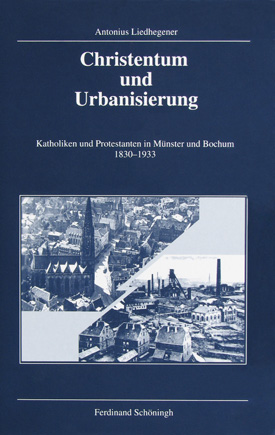Liedhegener, Antonius: Christentum und Urbanisierung. Katholiken und Protestanten in Münster und Bochum 1830–1933, Paderborn [u. a.] 1997

The emergence of the modern world is interwoven in manifold ways with the urbanization that occurred in the 19th and 20th centuries. From a religious perspective, as early as the Wilhelmine Empire major cities were seen as the key focal points of declining church membership and secularization in Germany. But does the widespread picture of deconfessionalized cities accord with historical reality? Antonius Liedhegener’s book constitutes the first attempt to examine this question through a long-range comparative analysis of two different cities.
This pioneering study’s findings surprise: whether in a traditional center of administration and services, such as Münster, or in a young industrial city populated by workers, such as Bochum, confessional affiliation was the primary indicator of active church participation. As urbanization and industrialization intensified, dense Catholic milieus centered around Catholic churches emerged. As late as the final Weimar years, 60 % of all Catholics in Münster as well as Bochum attended Easter Communion. By contrast, Protestants in those cities evinced steadily declining church attendance and reception of the Eucharist. Catholics and Protestants in Münster and Bochum lived in separate worlds, the more so with each passing decade.
Combining »story-telling« sources with statistical surveys, Liedhegener succeeds in systematically and vividly presenting the history of Catholic and Protestant communities in their respective socioeconomic contexts. More than 100 graphics and tables illustrate the author’s findings on social change, pastoral care, religious associational life, degree of commitment to the churches, voting behaviour, and church membership cancellation. Liedhegener’s study contributes to scholarship on the »everyday life« and cultural history of German Catholicism and Protestantism. At the same time, it helps bridge the gap between newer studies of urbanization, on the one hand, and, on the other, research into church history in the modern era.
To order our publications, please, contact your local bookshop or the publishing house Schöningh in Paderborn.
